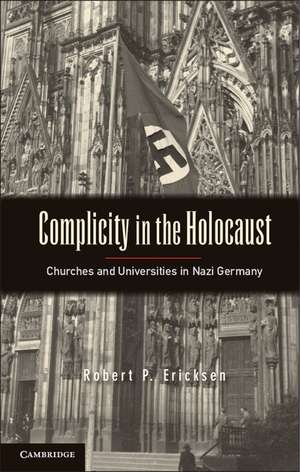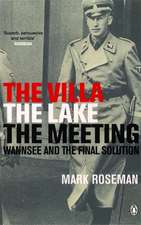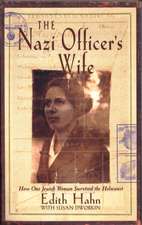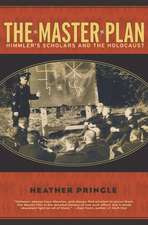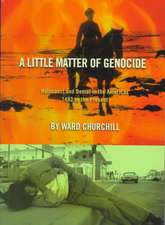Complicity in the Holocaust: Churches and Universities in Nazi Germany
Autor Robert P. Ericksenen Limba Engleză Paperback – 5 feb 2012
| Toate formatele și edițiile | Preț | Express |
|---|---|---|
| Paperback (1) | 159.59 lei 3-5 săpt. | |
| Cambridge University Press – 5 feb 2012 | 159.59 lei 3-5 săpt. | |
| Hardback (1) | 552.94 lei 6-8 săpt. | |
| Cambridge University Press – 4 feb 2012 | 552.94 lei 6-8 săpt. |
Preț: 159.59 lei
Nou
Puncte Express: 239
Preț estimativ în valută:
30.54€ • 33.16$ • 25.65£
30.54€ • 33.16$ • 25.65£
Carte disponibilă
Livrare economică 01-15 aprilie
Preluare comenzi: 021 569.72.76
Specificații
ISBN-13: 9781107663336
ISBN-10: 1107663334
Pagini: 280
Ilustrații: black & white illustrations
Dimensiuni: 150 x 226 x 18 mm
Greutate: 0.38 kg
Editura: Cambridge University Press
Colecția Cambridge University Press
Locul publicării:New York, United States
ISBN-10: 1107663334
Pagini: 280
Ilustrații: black & white illustrations
Dimensiuni: 150 x 226 x 18 mm
Greutate: 0.38 kg
Editura: Cambridge University Press
Colecția Cambridge University Press
Locul publicării:New York, United States
Cuprins
1. Why the Holocaust matters in a century of death; 2. Churches and the rise of Hitler; 3. Universities and the rise of Hitler; 4. Consent and collaboration: the churches through 1945; 5. The intellectual arm: universities through 1945; 6. Repressing and reprocessing the past: denazification and its legacy of dissimulation; 7. A closer look: denazification at Göttingen University; 8. Implications.
Recenzii
'Based on decades of his own research and complete mastery of both German- and English-language scholarship in the field, Robert Ericksen demonstrates convincingly how a critical mass of churchmen and academics in Germany enthusiastically embraced the Nazi regime and provided the rationalizations and adjustment of moral norms that permitted ordinary Germans to accept and even implement the regime's brutal and murderous policies.' Christopher R. Browning, Frank Porter Graham Professor of History, University of North Carolina, Chapel Hill
'Robert P. Ericksen has given us a masterful comparative study of the churches and the universities in Nazi Germany. Two institutions entrusted to foster the collective conscience and intellect of the German people are revealed to have compromised their integrity by collaborating in the Holocaust, despite the fact that Jews had been crucial in creating Christianity (Jesus and Paul) and enhancing German academic scholarship.' Susannah Heschel, author of The Aryan Jesus: Christian Theologians and the Bible in Nazi Germany (2008)
'Robert P. Ericksen's reputation as an important authority on Nazi Germany and the Holocaust is based not only on his careful and original scholarship, but also on his insistence on moral clarity. He does not shirk from assigning individual and collective responsibility for the crimes of Nazism. This book makes compelling reading, and will most certainly stimulate debate among its many readers.' Alan E. Steinweis, University of Vermont
'The book is written in a calm, fluent style, easy to read and brimming with careful research, accessible to the general reader … it deserves to be celebrated for its moral courage, lucid prose and splendid craftsmanship - in spite of its complex and emotive content, it reads with beguiling simplicity. Ericksen presents a damning case against the German Church and academy. And by pointing the finger so consistently at educational and moral leaders, he raises questions pertinent to today. Are there evils in twenty-first-century society that universities and the Church could do more to speak out against?' The Times Higher Education Supplement
'… a thoroughly successful summary …' Dirk Schuster, Arbeitstitel
'Ericksen's book is helpful because it begins the story of complicity not in 1933, with the rise of Adolf Hitler to the chancellorship, but instead in 1923, with the decade-long religious and ideological tumultuousness that marked the Weimar Republic.' Charles Gallagher, German Studies Review
'… a compelling piece of scholarship that is eminently readable, frequently thought-provoking, and deeply insightful.' Derek Hastings, The Catholic Historical Review
'More forcefully and uncompromisingly than any other Holocaust scholar, Ericksen argues for the importance of churches and universities to Nazi-era Germans. … Ericksen's assessments of American occupation policy and post-war discourse on the role of the clergy and universities in the Holocaust are among his most crucial contributions.' Paul Bookbinder, European History Quarterly
'Robert P. Ericksen has given us a masterful comparative study of the churches and the universities in Nazi Germany. Two institutions entrusted to foster the collective conscience and intellect of the German people are revealed to have compromised their integrity by collaborating in the Holocaust, despite the fact that Jews had been crucial in creating Christianity (Jesus and Paul) and enhancing German academic scholarship.' Susannah Heschel, author of The Aryan Jesus: Christian Theologians and the Bible in Nazi Germany (2008)
'Robert P. Ericksen's reputation as an important authority on Nazi Germany and the Holocaust is based not only on his careful and original scholarship, but also on his insistence on moral clarity. He does not shirk from assigning individual and collective responsibility for the crimes of Nazism. This book makes compelling reading, and will most certainly stimulate debate among its many readers.' Alan E. Steinweis, University of Vermont
'The book is written in a calm, fluent style, easy to read and brimming with careful research, accessible to the general reader … it deserves to be celebrated for its moral courage, lucid prose and splendid craftsmanship - in spite of its complex and emotive content, it reads with beguiling simplicity. Ericksen presents a damning case against the German Church and academy. And by pointing the finger so consistently at educational and moral leaders, he raises questions pertinent to today. Are there evils in twenty-first-century society that universities and the Church could do more to speak out against?' The Times Higher Education Supplement
'… a thoroughly successful summary …' Dirk Schuster, Arbeitstitel
'Ericksen's book is helpful because it begins the story of complicity not in 1933, with the rise of Adolf Hitler to the chancellorship, but instead in 1923, with the decade-long religious and ideological tumultuousness that marked the Weimar Republic.' Charles Gallagher, German Studies Review
'… a compelling piece of scholarship that is eminently readable, frequently thought-provoking, and deeply insightful.' Derek Hastings, The Catholic Historical Review
'More forcefully and uncompromisingly than any other Holocaust scholar, Ericksen argues for the importance of churches and universities to Nazi-era Germans. … Ericksen's assessments of American occupation policy and post-war discourse on the role of the clergy and universities in the Holocaust are among his most crucial contributions.' Paul Bookbinder, European History Quarterly
Notă biografică
Descriere
This book argues that enthusiasm for Hitler within churches and universities effectively gave Germans permission to participate in the Nazi regime.
